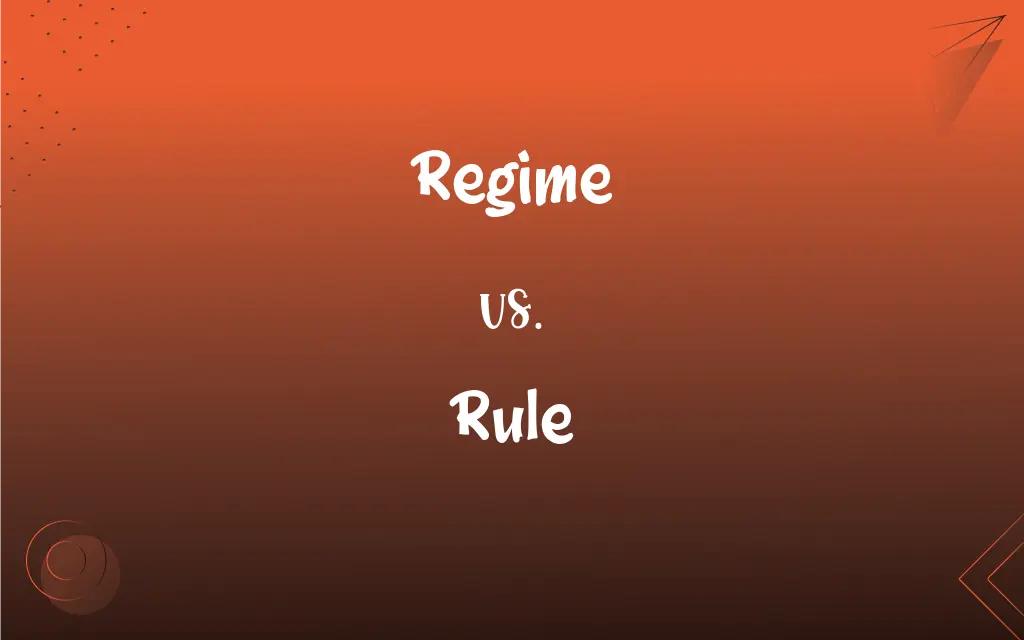Regime vs. Rule: What's the Difference?
Edited by Aimie Carlson || By Harlon Moss || Published on December 2, 2023
A regime is a governing system or a period of rule, often political, while a rule is a prescribed guideline or law within a system.

Key Differences
A regime refers to an entire system of government or administration, often with political connotations. Rule, on the other hand, typically refers to specific guidelines, laws, or principles that operate within a system.
Regime often carries political or authoritative connotations, sometimes negative, referring to the way a country or organization is governed. Rule implies a more specific directive or standard that must be followed.
The term regime often implies a certain duration and stability of governance, whether democratic or authoritarian. A rule, however, is a singular directive that can be established or changed within the broader context of a regime.
Regime usually refers to the overall system of control, including its structures and leaders. Rule denotes the individual laws or guidelines set by the authority of the regime.
A regime encompasses the entire spectrum of governance, including its policies and cultural impact. A rule is a component of this governance, detailing specific expectations or procedures.
ADVERTISEMENT
Comparison Chart
Definition
A system of governance or period of ruling
A specific guideline or law within a system
Connotation
Often political, with broader implications
More neutral, focused on specific directives
Duration
Implies a stable or lasting period
Can be temporary or subject to change
Scope
Encompasses overall governance structure
Pertains to individual directives
Authority
Refers to governing bodies or systems
Set by those in power within the regime
ADVERTISEMENT
Regime and Rule Definitions
Regime
A mode or system of rule or management.
The company's regime focused on innovation.
Rule
A principle or regulation set by an authority.
The school's rules were updated annually.
Regime
A form of government or ruling system.
The democratic regime established new policies.
Rule
A prescribed guide for conduct or action.
The rule of law is fundamental in a democracy.
Regime
A period during which a particular government is in power.
The regime lasted for several decades.
Rule
Control or dominion over an area.
The king's rule was just and fair.
Regime
A specific administration or leadership group.
The current regime implemented economic reforms.
Rule
A customary or habitual course of action.
As a rule, we avoid discussing politics at dinner.
Regime
A controlled or authoritarian system.
The oppressive regime was criticized internationally.
Rule
An established standard, law, or regulation.
The new traffic rules were enforced strictly.
Regime
A government, especially an oppressive or undemocratic one
A fascist regime.
Rule
Governing power or its possession or use; authority.
FAQs
Do regimes always have negative connotations?
Not always, but the term can carry negative connotations, especially in contexts of authoritarian rule.
Can a regime be democratic?
Yes, regimes can be democratic or authoritarian, depending on their nature of governance.
What are examples of rules?
Traffic laws, school regulations, and workplace policies are examples of rules.
What is a regime?
A regime is a system of government or the period during which a government is in power.
Is a regime larger than a rule?
In scope and concept, yes; a regime is a broader term encompassing the whole system of governance.
Can a regime change quickly?
Regimes often imply stability, but they can change, especially through political upheavals.
What is a rule?
A rule is a specific guideline, law, or standard set within a system.
Can individuals create rules?
Yes, individuals in positions of authority can set rules within their domains.
Do rules vary within different regimes?
Yes, rules can vary greatly depending on the nature and policies of the regime.
Can regimes be part of a peaceful society?
Yes, regimes can be part of peaceful societies, especially if they are democratic and fair.
Are rules always written?
Not always; some rules are customary or unwritten norms.
Can a regime be non-political?
While often political, the term can also refer to management systems in organizations or companies.
Do rules apply to everyone?
Ideally, rules apply to everyone within the jurisdiction or system where they are established.
Who decides on the rules?
Rules are decided by authorities, organizations, or governing bodies within a regime.
How long do regimes last?
The duration of regimes varies, from short-lived to lasting for decades or even centuries.
How are rules enforced?
Rules are enforced by authorities or institutions within the context of a regime.
Are rules the same as laws?
Laws are formal rules enacted by legislative bodies, but rules can also include less formal guidelines.
What role do regimes play in politics?
Regimes are central in politics, defining the nature and approach of governance.
Can regimes be global?
While regimes typically refer to national governments, some use the term for international or global governance structures.
How do rules affect daily life?
Rules govern various aspects of daily life, from legal compliance to social behavior and organizational conduct.
About Author
Written by
Harlon MossHarlon is a seasoned quality moderator and accomplished content writer for Difference Wiki. An alumnus of the prestigious University of California, he earned his degree in Computer Science. Leveraging his academic background, Harlon brings a meticulous and informed perspective to his work, ensuring content accuracy and excellence.
Edited by
Aimie CarlsonAimie Carlson, holding a master's degree in English literature, is a fervent English language enthusiast. She lends her writing talents to Difference Wiki, a prominent website that specializes in comparisons, offering readers insightful analyses that both captivate and inform.







































































